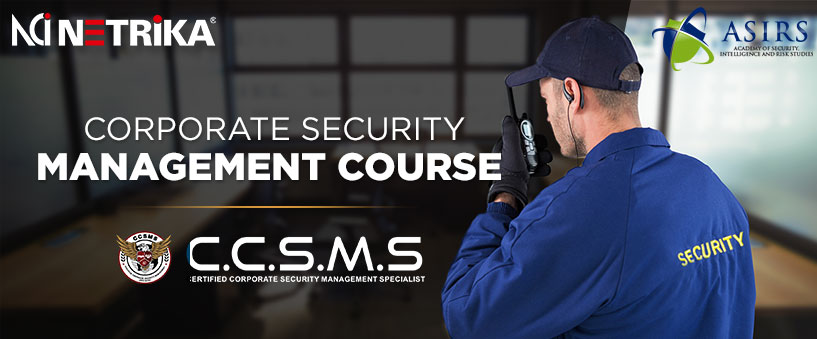Corporate Security Management Course
Corporate security certifications form the vital component of an enterprise that focuses on risk, crisis, business resilience, and business espionage. The certification is meant for risk management professionals who are keen on advancing their career opportunities and effectively protecting an organization’s tangible and intangible assets.
The corporate security certificate online judges the professional capabilities of a professional in their systematic approach to identify, analyze, plan, administer, quantify and monitor the corporate security function.
Corporate Security Training Courses
The certification enables aspirants to understand key security management principles and their interrelated applications and functions within a corporate culture. Assisting an aspirant’s journey Netrika a highly revered and trusted source of training career-oriented minds imparts insight into the various factors that influence Global Corporate Security Management Trends. The corporate security management course (CCSMS) from Netrika unfolds the strengthened competency of the Corporate Security portfolio.
The corporate security certification combines the right balance of knowledge, expertise risk findings and best practices to allow a specialist to mitigate the risk landscape in businesses. This expertise incorporates:
- Risk Assessment and Mitigation
Security and its compromise can have a wide-ranging field incorporated. This demands specialists to stay vigilant through assessments. The corporate security certifications enable specialists to assess the risk of physical, environmental or digital threats. This stage includes the Certified corporate security management specialist to perform or assist in the implementation of-
- Design, develop, and implement security protocols.
- Install, maintain, and repair security systems and hardware.
- Monitor security systems and activity.
- Identify potential threats to physical security, employee safety, and asset protection.
- Monitor and respond to emergency situations.
- Conduct security system inspections.
- Recommend security systems based on findings of security inspection.
- Coordinate emergency drills at central office and satellite locations.
- Conduct audits, assessments and risk evaluation
- Security training & management
Combining cyber and physical security, a corporate security specialist assists in the deployment of trained security managers to guard the facility, and at the same time implement robust cyber security measures. Moreover, a CCSMS certified specialist trains the security personnel and office employees about security upgradation and their role in risk mitigation.
A corporate security certification specialist undertakes the responsibility of enforcing policies for safeguarding the security of the corporate houses. They also ensure that all the company employees agree with the protocols and policies and are trained to act in the face of threat.
A specialist with corporate security certification ensures that the entire enterprise and all its employees comply with the organisation’s security policy and national and international regulations. The corporate security certification course amalgamates business & corporate security management and security risk & crisis management to offer deep insights into economic, industrial and corporate espionage, as well as emergency management to minimize the impact.
The completion of all 2 certificates, successfully passing the test and completing the prescribed assignment, provides the professional, a specialist status thus leading you to be designated as Certified Corporate Security Management Specialist.
Netrika focuses on the career development of aspirants while imbibing both theoretical and practical learnings to assist your growth in securing an ascending career graph. Being one of the best security courses in India, it equips aspirants with how security manages emergency planning, response, mitigating risk, and designing contingencies and countermeasures.


